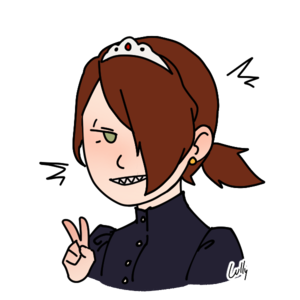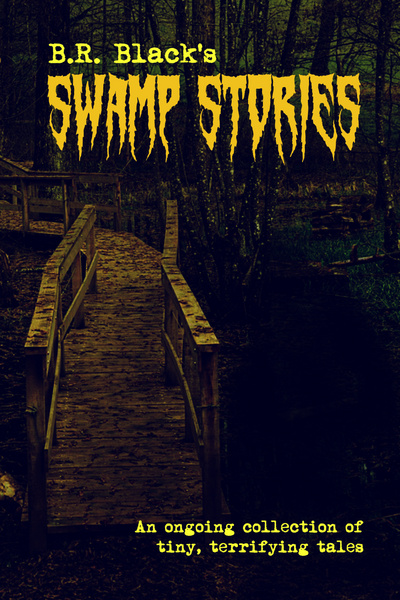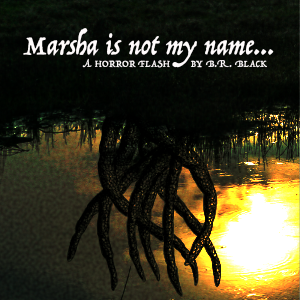This is my marsh; a salt marsh near the wide water that reaches to the ocean. I was gifted this area as guardian and I have tended to it for millennia. It is important that you know this, that you understand my perspective. I am nearly everywhere, but not below the sediment. I can see through the muck but not enter it. That is another domain and I know well enough not to tread there.
A long, orange vehicle rolls to a stop near the edge of the marsh. Coughing and grinding it disgorges lead, soot, and a small stream of children. Older children, it appears, and two adults. They look like serious vacationers, attempting to be curious but always on the brink of delight. I have come to understand these humans as “students,” and they come to the marsh “to student,” no, “to study.” My English is improving.
The long, orange vehicle keeps one extra adult behind. This one is in the front, in control, I suspect. Humans believe that the front always controls the back, but their perspective is limited, linear. The above also does not necessarily control below. Multidimensional hierarchies are infinite webs of connectivity. We link on whimsy or after the dissolution of an entire cosmos. My own little marsh, with its four to five hundred individual beings, is relatively simple. Size gives us power, and I am the biggest one here. Up here.
The older children put themselves into small groups and spread among the sediment and cordgrass. They hop from hump to hump, laughing and stumbling their way along. I enjoy their discovery. It’s a mixture of adventure and disgust. Over time, the sweet smell of them lingers like a haze just above the surface. Flowery and acrid, they come with some concoction that repels the smaller beasties. The mosquitos have been complaining of it for a while. But the universe likes karmic symmetry. Whatever repels, also attracts. A deep rumbling develops on the far edge of the marsh, but it moves.
I check on the human still in the vehicle. Strange thoughts swirl above his head. He–it thinks of itself as a he, this is something I’ve only just understood–he watches some of the older children, particularly those that think of themselves as she. His thoughts swim in and out of his head, trying to stay hidden, but escape like a compulsion. I don’t fully understand what the images represent, but instinct tells me the shes are aware. Their groups stray father from the vehicle than the others. I wonder if, like the mosquitoes, they are repelled by the smell of him.
“Ack!”
One of the shes is stuck. It’s a larger one that trailed along behind three smaller ones. She has sunk into the mud past her mid-leg. The others in her group approach to help, but are wary. She looks strong and may pull them in with her. She struggles, calling out, and reaches for clumps of cordgrass, which give way.
Another group, this one mixed of shes and hes, approaches, but only look on. Their cries show delight at the stuck she. Two of them point, then fold in half, shaking. Somehow, this doesn’t help the she escape.
From below, the movement increases, speeding forward and I realize that she has sunk deeper, past her midpoint. Her eyes bulge with terror as her hands claw at the mud. Memories fly out of her mind in bursts, random images from her past or, perhaps, her uncertain future. I have seen this nearly every time a human dies. Dreams fleeing from a decaying psyche, someone once said.
The two adults struggle to reach her, but they are useless. She is surrounded by young, strong, unhelpful older children, who merely watch. The only one that can reach her is below and close. I watch, since I can do nothing else.
The adults feel the tremors first and stop their approach. Arms out wide they attempt to balance themselves on the bog, but one of them falls backwards into the mud. The other turns toward its partner, away from the children, and will be spared the sight of what comes next.
The stuck-she stops struggling. Her arms go limp and her head snaps back violently. I see the others close to her flinch and retreat, but they’ve been too close for too long. When the she raises her head again, two irises swirl in each eye and blood trickles out of her nose. She is a big human, but not big enough to hold a demigod. Unfortunately, she will experience her disintegration in great detail.
She/it raises the arms, hands open, fingers splayed and slowly she/it emerges from the muck. Muck is such an ugly word for my precious mud and I have reviled it ever since I first learned it. It had a sharpness to it that belies the soothing slips of the marsh. Yet, in this instance, as she/it rises, I will use muck, so it marks a separation from the place and the thing hiding in it.
Thick tendrils of muscle and sinew sprout from the tips of each finger. Each one thickens to the girth of the she’s arms. They flail away from her, each one finding a human that can no longer get away. The shes nearest are first. Two are coiled up tightly and pulled into their air. Their screams are silenced only when the bodies burst. Two others, better at hopping from hump to hump, are pummeled into the muck–see?–so quickly even their cries had no time to escape.
The two adults, farthest away, struggle to stand and finally turn toward the yelling. Perhaps the tentacles that burst through their skulls give them grace, blocking them from witnessing the annihilation of their students. One by one, shes and hes, fall under the will of the demigod. Two are drown in the nearby creek, more by the sediment than the water. One is severed in two as he scrabbles across a stretch of cordgrass. The last two are impaled at the edge of the marsh, so close to the long yellow vehicle that escape may have been in sight. But the adult inside closes the door, and screaming, drives away.
She/it’s tentacles coils around the body and retreats into the marsh. It slips down into the mud. Below, it moves, pausing once to acknowledge me as witness. It speeds along under the muck, parallel to the road and into the distance.
I turn back to the marsh, my beloved stew of creation, now dotted with fabric and bone. I am alone again with only the mosquitoes for company, and all they do is complain.











Comments (0)
See all